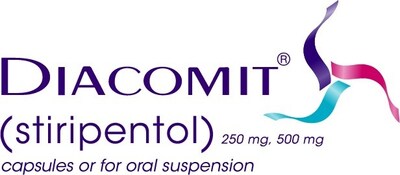BEDMINSTER, N.J., Nov. 14, 2024 /PRNewswire/ -- The global pharmaceutical company, Biocodex, a long-time pioneer in the treatment of rare pediatric diseases, is proud to announce they are developing a new oral-suspension formulation for DIACOMIT, an FDA-approved treatment indicated for the management of seizures associated with Dravet syndrome. This new formulation will be indicated for patients 6 months and older (weighing 15 lb or more) taking clobazam.1 Biocodex’s Research and Development (R&D) center in France is developing this latest innovation, which represents a significant advancement for young patients suffering from this rare, severe, and treatment-resistant form of epilepsy.
A 100% Biocodex Innovation
The new DIACOMIT oral suspension formulation is the result of years of dedicated research at Biocodex’s R&D center. This innovation underscores Biocodex’s ongoing commitment to address the needs of patients with rare diseases, particularly in pediatric epilepsy, where Biocodex led the first clinical trial for Dravet syndrome. Through continuous research and development, Biocodex remains at the forefront of improving care for those affected by this challenging condition.
“At Biocodex Orphan, our priority is to improve the quality of life for children affected by Dravet syndrome and their families at every stage of comprehensive care. This new development is a concrete testament to our commitment to providing innovative solutions tailored to children suffering from this syndrome,” said Caroline Schreiner, Vice President of Global Orphan Diseases at Biocodex.
Since the inception of Biocodex Orphan, the company has reaffirmed its commitment to expanding its portfolio of treatments for rare pediatric diseases, particularly in neuropediatrics, through partnerships and innovative solutions.
Meeting the Needs of Patients and Caregivers
DIACOMIT is an approved Dravet specific treatment, available in over 55 countries. Currently offered in capsules and sachets formats, DIACOMIT will be available as an oral suspension, a formulation better suited to the needs of younger patients, especially infants with low body weight, those who cannot swallow capsules, or require precise dose adjustments.
This new formulation will enhance administration ease, better meeting the needs of patients, caregivers, and the Dravet community.
Putting Patients First
Biocodex’s mission extends beyond treatment solutions. The company is committed to raising awareness about rare epilepsies alongside their ecosystem partners (healthcare professionals, patients, and caregivers), providing innovative solutions and services for holistic care for the Dravet community and establishing itself as a trusted partner in their journey.
About Dravet Syndrome
Dravet syndrome is a rare and severe genetic epilepsy that most commonly begins before the age of one when an otherwise normally developing child begins having frequent, prolonged seizures.2 These seizures can cause lasting damage, which over time can lead to developmental and cognitive delays, affecting coordination, language, and behavior.3 Its incidence is estimated to be 1 in 16,000 births.4
About Biocodex
Founded in 1953, Biocodex is a French family-owned pharmaceutical company that leverages life sciences, placing health and its balance at the heart of its corporate initiatives, innovations, and development for the benefit of patients worldwide.
A pioneer and leader in human microbiota health by marketing the first probiotic strain, the global organization has developed its activities around three strategic areas: microbiota, women’s health, and orphan diseases. It has also expanded its expertise by investing in other health areas, such as pain management, respiratory and ENT pathways, and neurology.
Present in 115 countries through its subsidiaries and partners, Biocodex emphasizes its territorial roots, which are central to its corporate social responsibility, producing in France for over 50 years across most of its value chain.
The Biocodex global organization is comprised of 1,700 employees who share common values, embodied in their daily missions and rooted in the company’s DNA.
To learn more about Biocodex visit: www.biocodex.com
To learn more about DIACOMIT visit: www.diacomit.com
INDICATION
DIACOMIT (stiripentol) is indicated for the treatment of seizures associated with Dravet syndrome (DS) in patients taking clobazam who are 6 months of age and older and weighing 7 kg or more. There are no clinical data to support the use of DIACOMIT as monotherapy in Dravet syndrome.
IMPORTANT SAFETY INFORMATION
CONTRAINDICATIONS
None
WARNINGS & PRECAUTIONS
Somnolence
DIACOMIT can cause somnolence. Monitor patients for somnolence, particularly when DIACOMIT is used concomitantly with other CNS depressants or clobazam, which is also known to cause somnolence.
Decreased Appetite and Decreased Weight
DIACOMIT can cause decreases in appetite and weight. The growth and weight of pediatric patients treated with DIACOMIT should be carefully monitored.
Neutropenia and Thrombocytopenia
DIACOMIT can cause significant declines in neutrophil and platelet counts. Hematologic testing should be obtained prior to starting treatment with DIACOMIT and then every 6 months.
Withdrawal Symptoms
As with most antiepileptic drugs (AEDs), DIACOMIT should be gradually withdrawn to minimize the risk of increased seizure frequency and status epilepticus.
Risks in Patients with Phenylketonuria (PKU)
DIACOMIT for oral suspension contains phenylalanine, which can be harmful to patients with PKU. Before prescribing DIACOMIT for oral suspension to a patient with PKU, consider the total daily intake of phenylalanine from all sources, including DIACOMIT for oral suspension. DIACOMIT capsules do not contain phenylalanine.
Suicidal Behavior and Ideation
AEDs, including DIACOMIT, increase the risk of suicidal thoughts or behavior. Patients treated with any AED for any indication should be monitored for the emergence or worsening of depression, suicidal thoughts or behavior, and/or any unusual changes in mood or behavior.
ADVERSE REACTIONS
The most common adverse reactions that occurred in at least 10% of DIACOMIT-treated patients and more frequently than on placebo were somnolence, decreased appetite, agitation, ataxia, decreased weight, hypotonia, nausea, tremor, dysarthria, and insomnia.
PREGNANCY
There are no adequate data on the developmental risks associated with the use of DIACOMIT in pregnant women. Based on animal data, DIACOMIT may cause fetal harm.
There is a pregnancy exposure registry that monitors pregnancy outcomes in women exposed to AEDs, such as DIACOMIT, during pregnancy. Physicians are advised to recommend that pregnant patients taking DIACOMIT enroll in the North American Antiepileptic Drug (NAAED) Pregnancy Registry (information at www.aedpregnancyregistry.org). This can be done by calling the toll-free number 1‑888‑233-2334 and must be done by patients themselves or their caregiver. To report suspected adverse reactions, contact Biocodex at 1‑866‑330-3050 or FDA at 1‑800‑FDA‑1088 or www.fda.gov/medwatch.
Please see full DIACOMIT Prescribing Information at www.DIACOMIT.com.
References:
1. DIACOMIT® [prescribing information]. Beauvais, France: Biocodex, Inc.; July 2022
2. Dravet C. The core Dravet syndrome phenotype. Epilepsia. 2011;52 Suppl 2:3-9. doi:10.1111/j.1528-1167.2011.02994.
3. Genton P, Velizarova R, Dravet C. Dravet syndrome: the long-term outcome. Epilepsia. 2011;52 Suppl 2:44-49. doi:10.1111/j.1528-1167.2011.03001.
4. Wu YW, Sullivan J, McDaniel SS, et al. Incidence of Dravet Syndrome in a US Population. Pediatrics. 2015;136(5):e1310-e1315. doi:10.1542/peds.2015-1807
© 2024 Biocodex, Inc. All rights reserved. DIACOMIT® is a registered trademark of Biocodex, Inc.
![]() View original content to download multimedia:https://www.prnewswire.com/news-releases/new-development-in-rare-pediatric-epilepsy-biocodex-announces-the-development-of-diacomit-stiripentol-oral-suspension-a-new-formulation-to-aid-in-the-treatment-of-dravet-syndrome-in-young-children-302306052.html
View original content to download multimedia:https://www.prnewswire.com/news-releases/new-development-in-rare-pediatric-epilepsy-biocodex-announces-the-development-of-diacomit-stiripentol-oral-suspension-a-new-formulation-to-aid-in-the-treatment-of-dravet-syndrome-in-young-children-302306052.html
SOURCE Biocodex, Inc.






